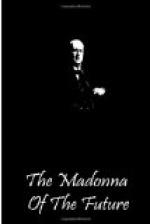Author: Henry James
Release Date: May 8, 2005 [eBook #2460]
Language: English
Character set encoding: ISO-646-us (us-ASCII)
***Start of the project gutenberg EBOOK the Madonna of the future***
Transcribed from the 1887 Macmillan and Co. edition by David Price, email ccx074@coventry.ac.uk, proofed by Jennifer Austin.
THE MADONNA OF THE FUTURE by Henry James
We had been talking about the masters who had achieved but a single masterpiece—the artists and poets who but once in their lives had known the divine afflatus and touched the high level of perfection. Our host had been showing us a charming little cabinet picture by a painter whose name we had never heard, and who, after this single spasmodic bid for fame, had apparently relapsed into obscurity and mediocrity. There was some discussion as to the frequency of this phenomenon; during which, I observed, H—– sat silent, finishing his cigar with a meditative air, and looking at the picture which was being handed round the table. “I don’t know how common a case it is,” he said at last, “but I have seen it. I have known a poor fellow who painted his one masterpiece, and”—he added with a smile—“he didn’t even paint that. He made his bid for fame and missed it.” We all knew H—– for a clever man who had seen much of men and manners, and had a great stock of reminiscences. Some one immediately questioned him further, and while I was engrossed with the raptures of my neighbour over the little picture, he was induced to tell his tale. If I were to doubt whether it would bear repeating, I should only have to remember how that charming woman, our hostess, who had left the table, ventured back in rustling rose-colour to pronounce our lingering a want of gallantry, and, finding us a listening circle, sank into her chair in spite of our cigars, and heard the story out so graciously that, when the catastrophe was reached, she glanced across at me and showed me a tear in each of her beautiful eyes.
* * * * *
It relates to my youth, and to Italy: two fine things! (H—– began). I had arrived late in the evening at Florence, and while I finished my bottle of wine at supper, had fancied that, tired traveller though I was, I might pay the city a finer compliment than by going vulgarly to bed. A narrow passage wandered darkly away out of the little square before my hotel, and looked as if it bored into the heart of Florence. I followed it, and at the end of ten minutes emerged upon a great piazza, filled only with the mild autumn moonlight. Opposite rose the Palazzo Vecchio, like some huge civic fortress, with the great bell-tower springing from its embattled verge as a mountain-pine from the edge of a cliff. At its base, in its projected




